产品安装配置手册
- 格式:docx
- 大小:26.95 KB
- 文档页数:8
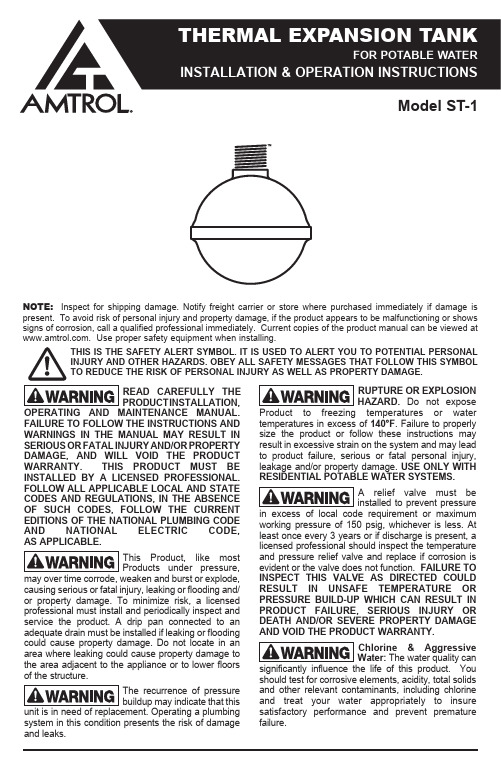
I NSTALLATION,FAILURE TO FOLLOW THE INSTRUCTIONS ANDWARNINGS IN THE MANUAL MAY RESULT INSERIOUS OR FATAL INJURY AND/OR PROPERTYDAMAGE, AND WILL VOID THE PRODUCT WARRANTY. THIS PRODUCT MUST BE INSTALLED BY A LICENSED PROFESSIONAL. FOLLOW ALL APPLICABLE LOCAL AND STATE CODES AND REGULATIONS, IN THE ABSENCE OF SUCH CODES, FOLLOW THE CURRENT EDITIONS OF THE NATIONAL PLUMBING CODE AND NATIONAL ELECTRIC CODE,causing serious or fatal injury, leaking or flooding and/or property damage. To minimize risk, a licensed professional must install and periodically inspect and service the product. A drip pan connected to an adequate drain must be installed if leaking or flooding could cause property damage. Do not locate in an area where leaking could cause property damage to the area adjacent to the appliance or to lower floorssystem in this condition presents the risk of damageand leaks.Do not expose temperatures in excess of 140°F . Failure to properly size the product or follow these instructions may result in excessive strain on the system and may lead to product failure, serious or fatal personal injury, leakage and/or property damage. USE ONLY WITHworking pressure of 150 psig, whichever is less. At least once every 3 years or if discharge is present, a licensed professional should inspect the temperature and pressure relief valve and replace if corrosion is evident or the valve does not function. FAILURE TO INSPECT THIS VALVE AS DIRECTED COULD RESULT IN UNSAFE TEMPERATURE OR PRESSURE BUILD-UP WHICH CAN RESULT IN PRODUCT FAILURE, SERIOUS INJURY OR DEATH AND/OR SEVERE PROPERTY DAMAGEThe water quality canshould test for corrosive elements, acidity, total solids and other relevant contaminants, including chlorine and treat your water appropriately to insure satisfactory performance and prevent premature failure.NOTE: Inspect for shipping damage. Notify freight carrier or store where purchased immediately if damage is present. To avoid risk of personal injury and property damage, if the product appears to be malfunctioning or shows signs of corrosion, call a qualified professional immediately. Current copies of the product manual can be viewed at . Use proper safety equipment when installing.THIS IS THE SAFETY ALERT SYMBOL. IT IS USED TO ALERT YOU TO POTENTIAL PERSONAL INJURY AND OTHER HAZARDS. OBEY ALL SAFETY MESSAGES THAT FOLLOW THIS SYMBOL TO REDUCE THE RISK OF PERSONAL INJURY AS WELL AS PROPERTY DAMAGE.Model ST-1ApplicationThe ST-1 expansion tank is for use on tankless, residential on-demand water heaters with a total water content of 2 gallons or less and a maximum set point of 140°F. Do not use with larger storage-type water heaters, as these will exceed the capacity of the ST-1.Installation1. Install the expansion tank on the cold watersupply line to the water heater at a point between the water heater and backflow preventer or other one-way device (Figure 1).2. Once the expansion tank is installed, checkthe cold water supply line for any leakage.Make repairs if necessary.3. Before the initial firing of the water heater,open a hot water fixture and draw for one minute to purge air. Next, close and open the fixture in 30 second intervals, repeating three thimes to flush the tank and piping.Finally, turn the water heater temperature control to desired ending temperature (see water heater instructions). Do not set temperature higher than the expansion tank maximum.4. To relieve initial thermal expansion, slightlyopen a hot water faucet. Continue until water heater temperature is satisfied. Once heater is at its operating range, no further bleeding of expanded water is required.5. The water heater and expansion tank willnow be operational. The expansion tank will control pressure increases caused by thermal expansion to a level below the water heater relief valve setting. FOR USE ON TANKLESS RESIDENTIAL ON DEMAND WATER HEATERS WITH A TOTAL WATER CONTENT OF 2 GALLONS OR LESS ANDA MAXIMUM SET POINT OF 140° F. NON-ADJUSTABLE PRECHARGE.PSI Volume (cu.in.)Weight (lb.).000.00.8720.00 3.92 1.0140.00 5.77 1.0760.007.43 1.1380.008.17 1.16100.008.63 1.18120.009.00 1.19140.009.27 1.20150.009.27 1.20 MaintenanceA licensed professional should check the complete system, including the expansion tank, yearly and more frequently as the system ages. WarrantyST-1 Model: Seven (7) Year Limited Warranty Visit for complete warranty details.PLEASE READ THE FOLLOWING INSTRUCTIONS CAREFULLYI MPORTANT GENERAL SAFETY INFORMATION -ADDITIONAL SPECIFIC SAFETY ALERTS APPEAR IN THE FOLLOWING INSTRUCTIONS.1400 Division Road, West Warwick, RI 02893 USA T: 800.426.8765© 2020 Worthington Industries Inc. Part #: 9013-017 (01/21) One or more features of this product are covered by U.S. patents, visit /patents for more information.。
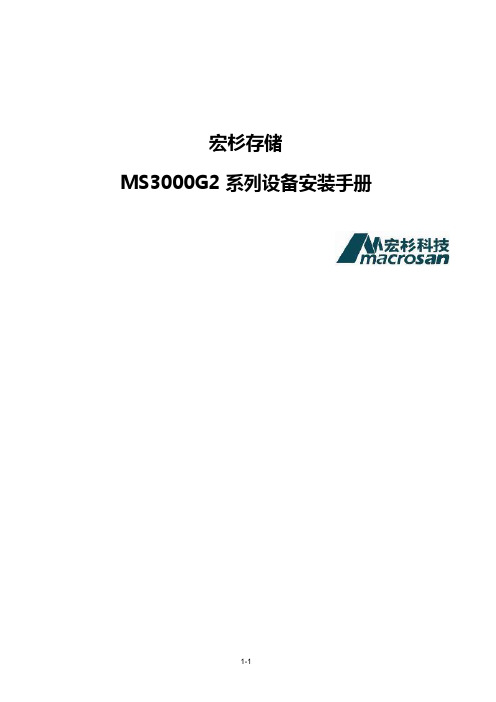
宏杉存储MS3000G2 系列设备安装手册目录MacroSAN MS3000G2 系列存储设备.......................................................1-1 安装手册................................................................................1-1 商标信息................................................................................1-2 目录....................................................................................1-3 图目录..................................................................................1-8 表目录................................................................................ 1-12 1 前言................................................................................ 1-151.1 读者对象........................................................................... 1-151.2 适用范围........................................................................... 1-151.3 文档结构........................................................................... 1-151.4 文档约定........................................................................... 1-161.4.1 手册描述约定................................................................. 1-161.4.2 其他约定..................................................................... 1-161.5 术语............................................................................... 1-171.5.1 DSU ...................................................................................................................................... 1-171.5.2 EMC ...................................................................................................................................... 1-171.5.3 EP ......................................................................................................................................... 1-171.5.4 FC ......................................................................................................................................... 1-171.5.5 GE ........................................................................................................................................ 1-171.5.6 GUI .............................................................................................................................................. 1-171.5.7 iSCSI ..................................................................................................................................... 1-171.5.8 ODSP ................................................................................................................................... 1-171.5.9 ODSP Scope ........................................................................................................................ 1-171.5.10 SAN .................................................................................................................................... 1-181.5.11 SAS .................................................................................................................................... 1-181.5.12 SATA .................................................................................................................................. 1-181.5.13 SP ....................................................................................................................................... 1-181.5.14 SPU .................................................................................................................................... 1-181.5.15 SSD .................................................................................................................................... 1-181.6 资料获取方式....................................................................... 1-181.7 资料意见或建议反馈方式............................................................. 1-18 2设备使用注意事项 .................................................................... 2-192.1 用电安全注意事项................................................................... 2-192.2 防静电安全注意事项................................................................. 2-192.2.1 佩戴防静电腕带方法........................................................... 2-192.2.2 无防静电腕带时紧急操作方法 ................................................... 2-202.3 激光安全注意事项................................................................... 2-202.4 电池安全注意事项................................................................... 2-202.5 EMC 注意事项...................................................................... 2-202.6 磁盘使用注意事项................................................................... 2-212.7 操作安全注意事项................................................................... 2-223 产品介绍 ............................................................................ 3-223.1 产品概述........................................................................... 3-223.2 产品规格........................................................................... 3-233.2.1 SPU 规格........................................................................ 3-233.2.2 DSU 规格 .................................................................... 3-243.2.3 磁盘模块规格................................................................. 3-253.3 产品外观........................................................................... 3-263.3.1 SPU 外观........................................................................ 3-263.3.2 DSU 外观 .................................................................... 3-333.3.3 电源模块外观................................................................. 3-423.3.4 磁盘模块外观................................................................. 3-433.4 产品指示灯......................................................................... 3-453.4.1 SP 指示灯.................................................................... 3-453.4.2 EP 指示灯.................................................................... 3-463.4.3 电源模块指示灯............................................................... 3-473.4.4 风扇模块指示灯............................................................... 3-473.4.5 电池模块指示灯............................................................... 3-483.4.6 磁盘模块指示灯............................................................... 3-483.4.7 IO 插卡模块指示灯............................................................. 3-484 安装设备 ............................................................................ 4-504.1 安装规划........................................................................... 4-504.2 安装流程........................................................................... 4-514.3 安装前准备......................................................................... 4-524.3.1 准备安装场所................................................................. 4-524.3.2 准备机柜..................................................................... 4-554.3.3 准备安装工具................................................................. 4-564.4 安装前检查......................................................................... 4-564.4.1 检查环境..................................................................... 4-564.4.2 检查设备..................................................................... 4-574.4.3 检查线缆..................................................................... 4-594.5 安装机柜........................................................................... 4-594.5.1 安装机柜..................................................................... 4-594.5.2 安装机柜后检查............................................................... 4-604.6 安装托架式滑道..................................................................... 4-604.6.1 托架式滑道介绍............................................................... 4-604.6.2 确定滑道位置................................................................. 4-614.6.3 安装滑道..................................................................... 4-614.6.4 安装滑道后检查............................................................... 4-624.7 安装SPU ......................................................................................................................................... 4-634.7.1 安装SPU 流程................................................................ 4-634.7.2 安装SPU 到机柜中............................................................ 4-634.7.3 安装IO 插卡模块.............................................................. 4-644.7.4 安装SPU 电池模块(可选).................................................... 4-664.7.5 安装SPU 后检查.............................................................. 4-674.7.6 安装SPU 面板................................................................ 4-684.8 安装DSU ........................................................................................................................................ 4-684.8.1 安装DSU 流程................................................................... 4-684.8.2 安装DSU 到机柜中............................................................ 4-694.8.3 安装DSU 后检查.............................................................. 4-694.9 安装线缆........................................................................... 4-704.9.1 布线注意事项................................................................. 4-704.9.2 安装线缆流程................................................................. 4-724.9.3 安装接地线................................................................... 4-734.9.4 安装电源线................................................................... 4-744.9.5 安装SAS 线缆................................................................ 4-764.9.6 安装SP 业务接口线缆 ......................................................... 4-844.9.7 安装SP 管理网口线缆 ......................................................... 4-874.9.8 安装客户端服务器线缆......................................................... 4-874.9.9 安装线缆后检查............................................................... 4-88 5启动与配置设备 ...................................................................... 5-885.1 设备上电前检查..................................................................... 5-885.2 设备上电及启动..................................................................... 5-895.2.1 DSU 上电及启动 .............................................................. 5-895.2.2 DSU 启动后检查 .............................................................. 5-895.2.3 SPU 上电及启动............................................................... 5-895.2.4 SPU 启动后检查............................................................... 5-905.3 设备配置........................................................................... 5-915.3.1 设备默认配置................................................................. 5-915.3.2 设备配置准备................................................................. 5-915.3.3 设备配置..................................................................... 5-915.4 设备关机及下电..................................................................... 5-94 6安装与拆卸设备组件 .................................................................. 6-946.1 安装/拆卸SPU 面板..................................................................... 6-956.1.1 SPU 面板介绍................................................................. 6-956.1.2 安装SPU 面板................................................................ 6-956.1.3 拆卸SPU 面板................................................................ 6-956.2 安装/拆卸SP ................................................................................................................................... 6-956.2.1 SP 介绍 ......................................................................... 6-956.2.2 安装SP ................................................................................................................................. 6-966.2.3 拆卸SP ................................................................................................................................. 6-966.3 安装/拆卸EP ................................................................................................................................... 6-976.3.1 EP 介绍 ......................................................................... 6-976.3.2 安装EP ................................................................................................................................. 6-986.3.3 拆卸EP ................................................................................................................................. 6-996.4 安装/拆卸电源模块 ................................................................. 6-1006.4.2 安装电源模块................................................................ 6-1026.4.3 拆卸电源模块................................................................ 6-1026.5 安装/拆卸SPU 风扇模块 ............................................................ 6-1036.5.1 SPU 风扇模块介绍............................................................ 6-1036.5.2 安装SPU 风扇模块........................................................... 6-1036.5.3 拆卸SPU 风扇模块........................................................... 6-1036.6 安装/拆卸DSU 风扇模块 ............................................................ 6-1046.6.1 DSU 风扇模块介绍............................................................ 6-1046.6.2 安装DSU 风扇模块........................................................... 6-1056.6.3 拆卸DSU 风扇模块........................................................... 6-1066.7 安装/拆卸SPU 电池模块 ............................................................ 6-1066.7.1 SPU 电池模块介绍............................................................ 6-1066.7.2 安装SPU 电池模块........................................................... 6-1076.7.3 拆卸SPU 电池模块........................................................... 6-1076.8 安装/拆卸IO 插卡模块 .............................................................. 6-1086.8.1 IO 插卡模块介绍.............................................................. 6-1086.8.2 安装IO 插卡模块............................................................. 6-1086.8.3 拆卸IO 插卡模块............................................................. 6-1086.9 安装/拆卸磁盘模块 ................................................................. 6-1096.9.1 磁盘模块介绍................................................................ 6-1096.9.2 安装拆卸2.5 英寸磁盘模块(DSU1625)........................................ 6-1096.9.3 安装拆卸2.5 英寸磁盘模块(DSU2625)........................................ 6-1116.9.4 安装/拆卸3.5 英寸磁盘模块(SPU/DSU1616)................................... 6-1136.9.5 安装/拆卸3.5 英寸磁盘模块(DSU2624)........................................ 6-1156.9.6 安装磁盘假面板.............................................................. 6-116 7常见故障处理 ....................................................................... 7-1177.1 SP 故障处理....................................................................... 7-1177.1.1 故障现象1:SP 的告警指示灯闪烁或常亮........................................ 7-1177.1.2 故障现象2:SP 的运行指示灯常亮或常灭........................................ 7-1187.1.3 故障现象3:SP 启动过程中,LED 数码管无法显示信息 ........................... 7-1187.1.4 故障现象4:SP 启动过程中,LED 数码管停留在88 ......................................................... 7-1187.1.5 故障现象5:SP 启动过程中,LED 数码管长时间停留在某个固定值 ................. 7-1197.2 EP 故障处理....................................................................... 7-1197.2.1 故障现象1:告警指示灯闪烁或常亮............................................. 7-1197.2.2 故障现象2:运行指示灯常亮或常灭............................................. 7-1207.3 电源模块故障处理.................................................................. 7-1207.4 风扇模块故障处理.................................................................. 7-1217.5 电池模块故障处理.................................................................. 7-1217.6 磁盘模块故障处理.................................................................. 7-1227.7 其他故障处理...................................................................... 7-122 8附录A.拇指螺钉的安装方法........................................................... 8-122 9附录B.中国有害物质声明............................................................. 9-125图目录图3-1 SPU 前正视图(带面板).......................................................... 3-26 图3-2 SPU 前正视图(不带面板)........................................................ 3-26 图3-3 MS3000G2-FT SPU 后正视图...................................................... 3-27 图3-4 其他SPU 后正视图............................................................... 3-28 图3-5 MS3000G2-FT SP 正视图......................................................... 3-29 图3-6 其他SP 正视图 .................................................................. 3-30 图3-7 SPU 风扇模块正视图 ............................................................. 3-32 图3-8 电池模块正视图.................................................................. 3-32 图3-9 DSU1625 前正视图............................................................... 3-33 图3-10 DSU2625 前正视图.............................................................. 3-33 图3-11 DSU1616 前正视图.............................................................. 3-34 图3-12 DSU2624 前正视图.............................................................. 3-34 图3-13 DSU1625 后正视图.............................................................. 3-35 图3-14 DSU2625 后正视图.............................................................. 3-36 图3-15 DSU1616 后正视图.............................................................. 3-36 图3-16 DSU2624 后正视图.............................................................. 3-37 图3-17 DSU1616 的EP 正视图.......................................................... 3-38 图3-18 DSU2625 的EP 正视图.......................................................... 3-39 图3-19 DSU2624 的EP 正视图.......................................................... 3-40 图3-20 DSU 风扇模块正视图(一) ...................................................... 3-41 图3-21 DSU 风扇模块正视图(二) ...................................................... 3-41 图3-22 DSU 风扇模块正视图(三) ...................................................... 3-42 图3-23 DSU2624 电源模块正视图........................................................ 3-42 图3-24 其他电源模块正视图............................................................. 3-43 图3-25 3.5 英寸磁盘模块前面板.......................................................... 3-43 图3-26 2.5 英寸磁盘模块(DSU1625)前面板............................................. 3-44 图3-27 2.5 英寸磁盘模块(DSU2625)前面板............................................. 3-45 图4-1 存储设备的安装规划示意图........................................................ 4-51 图4-2 存储设备的安装流程示意图........................................................ 4-52 图4-3 设备防拆封条示意图.............................................................. 4-59 图4-4 托架式滑道(左侧滑道)示意图.................................................... 4-60 图4-5 安装左侧滑道示意图.............................................................. 4-61 图4-6 安装拇指螺钉示意图.............................................................. 4-62图4-7 检查滑道示意图.................................................................. 4-62 图4-8 SPU 安装流程示意图 ............................................................. 4-63 图4-9 安装SPU 示意图................................................................. 4-64 图4-10 拆卸IO 插卡假面板示意图........................................................ 4-65 图4-11 安装IO 插卡示意图.............................................................. 4-66 图4-12 安装电池模块示意图............................................................. 4-67 图4-13 安装SPU 面板示意图............................................................ 4-68 图4-14 DSU 安装流程示意图............................................................ 4-68 图4-15 安装DSU 示意图................................................................ 4-69 图4-16 固定线缆端子示意图............................................................. 4-70 图4-17 线缆捆扎示意图(一)........................................................... 4-71 图4-18 线缆捆扎示意图(二)........................................................... 4-72 图4-19 线缆捆扎示意图(三)........................................................... 4-72 图4-20 线缆安装流程示意图............................................................. 4-73 图4-21 接地线示意图................................................................... 4-73 图4-22 松开设备接地端子的螺钉示意图................................................... 4-74 图4-23 安装接地线示意图............................................................... 4-74 图4-24 电源线示意图................................................................... 4-75 图4-25 安装电源线示意图............................................................... 4-75 图4-26 电源线捆扎示意图............................................................... 4-76 图4-27 A 类SAS 线缆示意图............................................................ 4-77 图4-28 B 类SAS 线缆示意图............................................................ 4-77 图4-29 C 类SAS 线缆示意图............................................................ 4-77 图4-30 D 类SAS 线缆示意图............................................................ 4-78 图4-31 SAS 线缆上Mini SAS 连接器示意图 ............................................... 4-78 图4-32 SAS 线缆上Mini SAS HD 连接器示意图............................................ 4-79 图4-33 高速SAS 线缆弯曲半径示意图.................................................... 4-80 图4-34 MS3000G2 标准版SAS1 接口上SAS 线缆安装示意图................................ 4-81 图4-35 安装防尘盖的SAS 线缆示意图.................................................... 4-82 图4-36 拔出SAS 线缆示意图............................................................ 4-82 图4-37 安装SAS 线缆示意图............................................................ 4-84 图4-38 FC 线缆和接口示意图............................................................ 4-85 图4-39 GE 线缆和接口示意图............................................................ 4-85 图4-40 10GE 线缆和接口示意图 ......................................................... 4-86 图4-41 40GE 业务接口线缆示意图 ....................................................... 4-87图5-1 加载ODSP Scope 界面........................................................... 5-92 图5-2 ODSP Scope 设备管理界面........................................................ 5-93 图5-3 设备初始配置流程示意图.......................................................... 5-94 图6-1 安装/拆卸SPU 面板示意图 ........................................................ 6-95 图6-2 安装/拆卸SP 示意图.............................................................. 6-96 图6-3 安装/拆卸DSU2625 EP 示意图..................................................... 6-97 图6-4 安装/拆卸DSU1616 EP 示意图 .................................................... 6-98 图6-5 安装/拆卸DSU2624 EP 示意图..................................................... 6-98 图6-6 安装/拆卸DSU1616 电源模块示意图............................................... 6-101 图6-7 安装/拆卸SPU 风扇模块示意图 ................................................... 6-103 图6-8 安装/拆卸DSU2625 风扇模块示意图............................................... 6-104 图6-9 安装/拆卸DSU1616 风扇模块示意图............................................... 6-104 图6-10 安装/拆卸DSU2624 风扇模块示意图.............................................. 6-105 图6-11 安装/拆卸SPU 电池模块示意图 .................................................. 6-107 图6-12 安装/拆卸IO 插卡模块示意图 .................................................... 6-108 图6-13 2.5 英寸磁盘模块(DSU1625)示意图............................................ 6-110 图6-14 DSU1625 磁盘槽位编号示意图................................................... 6-110 图6-15 2.5 英寸磁盘模块(DSU1625)示意图............................................ 6-110 图6-16 安装2.5 英寸磁盘模块(DSU1625)示意图........................................ 6-111 图6-17 2.5 英寸磁盘模块(DSU2625)示意图............................................ 6-111 图6-18 DSU2625 磁盘槽位编号示意图................................................... 6-112 图6-19 2.5 英寸磁盘模块(DSU2625)示意图............................................ 6-112 图6-20 安装2.5 英寸磁盘模块(DSU2625)示意图........................................ 6-112 图6-21 3.5 英寸磁盘模块(SPU/DSU1616)示意图........................................ 6-113 图6-22 SPU 磁盘槽位编号示意图 ....................................................... 6-113 图6-23 DSU1616 磁盘槽位编号示意图................................................... 6-114 图6-24 3.5 英寸磁盘模块(SPU/DSU1616)示意图........................................ 6-114 图6-25 安装3.5 英寸磁盘模块(SPU/DSU1616)示意图................................... 6-114 图6-26 3.5 英寸磁盘模块(DSU2624)示意图............................................ 6-115 图6-27 DSU2624 磁盘槽位编号示意图................................................... 6-115 图6-28 3.5 英寸磁盘模块(DSU2624)示意图............................................ 6-116 图6-29 安装3.5 英寸磁盘模块(DSU2624)示意图........................................ 6-116 图8-1 拇指螺钉示意图................................................................. 8-123 图8-2 拇指螺钉安装正视图............................................................. 8-123 图8-3 拇指螺钉安装侧视图............................................................. 8-124图8-4 拇指螺钉与方孔条表面贴平....................................................... 8-124 图8-5 拇指螺钉错误安装示意图(一)................................................... 8-124 图8-6 拇指螺钉错误安装示意图(二)................................................... 8-125 图8-7 拇指螺钉错误安装示意图(三)................................................... 8-125表目录表1-1 文档结构........................................................................ 1-15 表2-1 磁盘安装要求.................................................................... 2-21 表3-1 SPU 规格 ....................................................................... 3-23 表3-2 DSU 规格....................................................................... 3-24 表3-3 磁盘模块规格.................................................................... 3-25 表3-4 SPU 前正视图组件说明 ........................................................... 3-26 表3-5 SPU 后正视图组件说明 ........................................................... 3-28 表3-6 MS3000G2-FT SP 正视图组件说明................................................. 3-29 表3-7 其他SP 正视图组件说明 .......................................................... 3-31 表3-8 SPU 风扇模块正视图组件说明...................................................... 3-32 表3-9 电池模块正视图组件说明.......................................................... 3-32 表3-10 DSU1625 前正视图组件说明...................................................... 3-33 表3-11 DSU2625 前正视图组件说明...................................................... 3-33 表3-12 DSU1616 前正视图组件说明...................................................... 3-34 表3-13 DSU2624 前正视图组件说明...................................................... 3-34 表3-14 DSU1625 后正视图组件说明...................................................... 3-35 表3-15 DSU2625 后正视图组件说明...................................................... 3-36 表3-16 DSU1616 后正视图组件说明...................................................... 3-37 表3-17 DSU2624 后正视图组件说明...................................................... 3-37 表3-18 DSU1616 的EP 正视图组件说明.................................................. 3-38 表3-19 DSU2625 的EP 正视图组件说明.................................................. 3-39 表3-20 DSU2624 的EP 正视图组件说明.................................................. 3-40 表3-21 DSU 风扇模块正视图(一)组件说明 .............................................. 3-41 表3-22 DSU 风扇模块正视图(二)组件说明 .............................................. 3-41 表3-23 DSU 风扇模块正视图(三)组件说明 .............................................. 3-42 表3-24 DSU2624 电源模块正视图组件说明................................................ 3-42 表3-25 其他电源模块正视图组件说明..................................................... 3-43 表3-26 3.5 英寸磁盘模块前面板组件说明.................................................. 3-44 表3-27 2.5 英寸磁盘模块(DSU1625)前面板组件说明..................................... 3-44 表3-28 2.5 英寸磁盘模块(DSU2625)前面板组件说明..................................... 3-45 表3-29 SP 指示灯规格.................................................................. 3-45 表3-30 EP 指示灯规格.................................................................. 3-46 表3-31 电源模块指示灯规格............................................................. 3-47表3-32 风扇模块指示灯规格(一)....................................................... 3-47 表3-33 风扇模块指示灯规格(二)....................................................... 3-47 表3-34 电池模块指示灯规格............................................................. 3-48 表3-35 磁盘模块指示灯规格............................................................. 3-48 表3-36 IO 插卡模块指示灯规格 .......................................................... 3-48 表4-1 环境温度要求.................................................................... 4-52 表4-2 环境湿度要求.................................................................... 4-53 表4-3 机房灰尘含量要求................................................................ 4-53 表4-4 机房有害气体限值................................................................ 4-54 表4-5 环境供电要求.................................................................... 4-55 表4-6 安装前环境检查表................................................................ 4-57 表4-7 安装前设备检查表................................................................ 4-58 表4-8 安装前线缆检查表................................................................ 4-59 表4-9 安装机柜后检查表................................................................ 4-60 表4-10 安装滑道后检查表............................................................... 4-62 表4-11 安装SPU 后检查表.............................................................. 4-67 表4-12 安装DSU 后检查表.............................................................. 4-70 表4-13 线扣捆扎对照表................................................................. 4-71 表4-14 SAS 线缆类型 .................................................................. 4-76 表4-15 高速线缆最小弯曲半径实测对照表................................................. 4-79 表4-16 MS3000G2 标准版SAS 接口上DSU 互连关系 ...................................... 4-81 表4-17 SAS 线缆配置规则 .............................................................. 4-82 表4-18 SAS 线缆安装方向 .............................................................. 4-83 表4-19 安装线缆后检查表............................................................... 4-88 表5-1 启动DSU 后检查表............................................................... 5-89 表5-2 启动SPU 后检查表............................................................... 5-90 表5-3 设备默认配置.................................................................... 5-91 表5-4 管理串口参数.................................................................... 5-91 表6-1 电源模块参数................................................................... 6-101 表6-2 电源模块安装方向............................................................... 6-101 表7-1 SP 故障处理1 ........................................................................................................................... 7-117 表7-2 SP 故障处理2 ........................................................................................................................... 7-118 表7-3 SP 故障处理3 ........................................................................................................................... 7-118 表7-4 SP 故障处理4 ........................................................................................................................... 7-119 表7-5 SP 故障处理5 ........................................................................................................................... 7-119。

RMX 2000-安装配置手册-V5-L3【Polycom PGS】— 2013年1月—文档修正记录文档属性属性内容文档名称RMX 2000-安装配置手册-V5-L3维护部门或团队东北能源团队首次发布日期当前版本号备注说明文档变更记录(描述本次文档维护人变更记录)序号变更原因变更日期当前维护人变更描述1版本更新2013-1-24苏展第一版23456修订内容(描述本次修订的各具体内容)序号修订章节修订日期修订内容123456789101112131415目录第1章RMX 2000产品介绍 ................................................................................... 错误!未定义书签。
产品功能 ......................................................................................................... 错误!未定义书签。
硬件架构 ......................................................................................................... 错误!未定义书签。
系统容量 ......................................................................................................... 错误!未定义书签。
RMX 2000面板介绍 ....................................................................................... 错误!未定义书签。
前面板介绍 ............................................................................................. 错误!未定义书签。
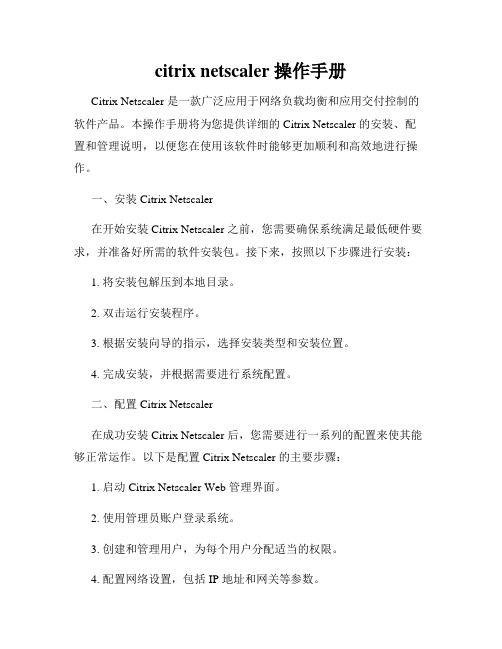
citrix netscaler 操作手册Citrix Netscaler 是一款广泛应用于网络负载均衡和应用交付控制的软件产品。
本操作手册将为您提供详细的 Citrix Netscaler 的安装、配置和管理说明,以便您在使用该软件时能够更加顺利和高效地进行操作。
一、安装 Citrix Netscaler在开始安装 Citrix Netscaler 之前,您需要确保系统满足最低硬件要求,并准备好所需的软件安装包。
接下来,按照以下步骤进行安装:1. 将安装包解压到本地目录。
2. 双击运行安装程序。
3. 根据安装向导的指示,选择安装类型和安装位置。
4. 完成安装,并根据需要进行系统配置。
二、配置 Citrix Netscaler在成功安装 Citrix Netscaler 后,您需要进行一系列的配置来使其能够正常运作。
以下是配置 Citrix Netscaler 的主要步骤:1. 启动 Citrix Netscaler Web 管理界面。
2. 使用管理员账户登录系统。
3. 创建和管理用户,为每个用户分配适当的权限。
4. 配置网络设置,包括 IP 地址和网关等参数。
5. 配置服务器以确保 Citrix Netscaler 可以正常访问它们。
6. 配置负载均衡服务以实现分发流量和提供高可用性。
7. 配置转发和代理规则,以实现特定的流量控制和应用访问控制。
8. 配置 SSL 加密和证书管理,以确保传输的安全性。
9. 配置监控和报告功能,用于实时监测系统性能和应用交付情况。
三、管理 Citrix Netscaler一旦 Citrix Netscaler 配置完成,您可以使用管理功能来监视、维护和优化系统。
以下是一些常见的管理任务:1. 监视系统性能,包括 CPU、内存和网络使用情况。
2. 管理负载均衡服务,包括添加、删除和修改服务器等。
3. 配置会话持久性,以确保用户会话的连续性和可靠性。
4. 管理 SSL 证书和加密功能,以确保传输的安全性。

1.0 安装说明1.1 安装指南1.1.1 安装位置注意在安装配套设备时,请确保交流电源线、PLC、电磁阀、启动器、继电器或其它类型的电气接口设备与本产品保持适当距离,避免不同设备之间产生电磁干扰。
需特别注意安装变频器、伺服驱动器和开关电源等强干扰源设备时与本产品保持较远距离,此类设备的输入和输出线请务必采用屏蔽电缆线,并将屏蔽网接到系统的星形接地点。
1.1.2 环境注意事项1.2.1 电源要求1.1.3 应用环境本公司产品是依据工业应用环境而设计,设计的应用环境温度能够在-10℃~50℃的大多数工业环境中稳定工作,可能不适用于某些特别的室外环境,请使用者慎重选择!1.1.4 电气环境本公司产品已经通过测试符合欧盟CE电气认证的标准,即产品的电路设计可以抵抗电气噪声的干扰,但并不保证适应所有情况的电气噪声干扰,请使用者正确的布线和接地以确保正确使用。
1.2 电源连接在安装本产品前请确认符合所在区域或国家的电气标准,详情请向厂家咨询。
显示尺寸整机尺寸有效显示区尺寸3.5英寸102.5*60*17mm73.44*48.96mm液晶屏尺寸85.5*55*4mm螺丝孔间距96*40mm显示尺寸整机尺寸开孔尺寸3.5英寸115*71*25mm107*65mm有效显示区尺寸73.44*48.96mm建议开孔尺寸109*67mm系列 安装说明书AST 正面背面左侧面右侧面4.5 AST035串口屏通讯接口针脚定义(三选一):底面5.1 AST035触摸屏正面通讯接口针脚定义(三选一):5.0 触摸屏系列请前往本公司官网下载编程软件,注意匹配编辑软件版本:《HMILite_Setup_V2.1组态软件》。
2.0 编程软件显示尺寸整机尺寸有效显示区尺寸2.4英寸78.5*48.5*17mm48.96*36.72mm液晶屏尺寸60.5*42.5*4mm螺丝孔间距68.5*36.5mm显示尺寸整机尺寸有效显示区尺寸2.8英寸86.5*55.5*17mm57.6*43.2mm液晶屏尺寸69*50*4mm螺丝孔间距78*46.5mm显示尺寸整机尺寸有效显示区尺寸2.4英寸78.5*48.5*12mm48.96*36.72mm液晶屏尺寸60.5*42.5*4mm螺丝孔间距68.5*36.5mm显示尺寸整机尺寸有效显示区尺寸2.8英寸86.5*55.5*12mm57.6*43.2mm液晶屏尺寸69*50*4mm螺丝孔间距78*46.5mm4.1 AST024串口屏背面左侧面右侧面3.0 型号定义AST K 028NGD通信类型:D表示串口1为485通信,E表示串口1为232通信,T表示串口1为TTL通信外壳颜色: G表示外壳颜色为灰色触摸类型: N表示不带TP ,R表示带TP 屏尺寸: 表示产品型号尺寸 2.8寸K:表示带按键,E表示经济款屏系列:表示串口屏系列ASTE024/028 通讯接口针脚定义:4.4 ASTE028串口屏4.2 AST028串口屏AST024/028 通讯接口针脚定义(三选一):4.0 串口屏系列。

Enterprise Networking Solution安装手册千兆企业V P N路由器TL-ER2220G声明Copyright © 2023 普联技术有限公司版权所有,保留所有权利未经普联技术有限公司明确书面许可,任何单位或个人不得擅自仿制、复制、誊抄或转译本手册部分或全部内容,且不得以营利为目的进行任何方式(电子、影印、录制等)的传播。
为普联技术有限公司注册商标。
本手册提及的所有商标,由各自所有人拥有。
本手册所提到的产品规格和资讯仅供参考,如有内容更新,恕不另行通知。
除非有特殊约定,本手册仅作为使用指导,所作陈述均不构成任何形式的担保。
I声明相关文档除本安装手册外,我们还提供以下文档的电子版本。
如需获取最新产品资料,请登录安装手册简介《千兆企业VPN路由器安装手册》主要介绍了路由器的硬件特性、安装方法以及在安装过程中应注意事项。
本手册包括以下章节:第1章:产品介绍。
简述路由器的基本功能特性并详细介绍外观信息。
第2章:产品安装。
指导路由器的硬件安装方法以及注意事项。
第3章:硬件连接。
指导路由器与其他设备之间的连接及注意事项。
第4章:登录WEB管理系统。
介绍设置路由器的方法。
第5章:云管理。
介绍云管理步骤。
附录A:常见故障处理。
II相关文档III阅读对象附录B:软硬件技术参数规格。
附录C:产品保修卡。
附录D:有毒有害物质声明。
说明:在安装设备之前及安装设备过程中为避免可能出现的设备损坏及人身伤害,请仔细阅读本手册相关内容。
阅读对象本手册适合下列人员阅读:网络工程师网络管理人员约定本手册所提到的路由器是指千兆企业VPN路由器,所有相关视图仅为示意说明,请以实际形态为准。
本手册采用了如下几种醒目标志来表示操作过程中应该注意的地方,这些标志的意义如目录第1章 产品介绍 —————————————011.1 产品简介 (01)1.2 产品外观 (01)第2章 产品安装 —————————————032.1 物品清单 (03)2.2 安装注意事项 (03)2.3 安装工具准备 (05)2.4 产品安装 (05)第3章 硬件连接 —————————————073.1 连接线缆 (07)3.2 连接电源 (07)3.3 设备初始化 (08)3.4 安装后检查 (08)第4章 登录WEB管理系统 ————————094.1 登录准备 (09)4.2 登录操作 (09)4.3 登录成功 (10)第5章 云管理 ——————————————12附录A 常见故障处理 ———————————13附录B 技术参数规格 ———————————14附录C 产品保修卡 ————————————17附录D 有毒有害物质声明 ————————18IV目录千兆企业VPN路由器安装手册01产品介绍第1章 产品介绍1.1 产品简介TP-LINK千兆企业VPN路由器系列产品主要定位于中小型企业、网吧、社区、酒店等网络环境,支持VPN、上网行为管理、AP管理、接入认证、防火墙、带宽控制、多WAN口负载均衡等丰富的功能特性,适合组建高速、安全且易管理的企业网络。
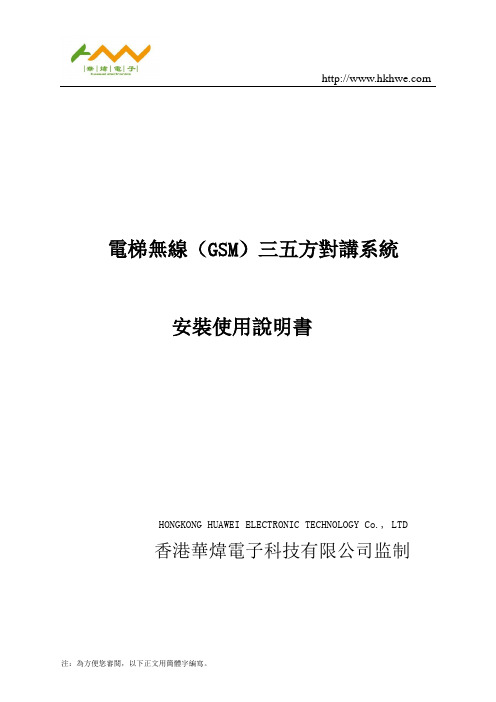
電梯無線(GSM)三五方對講系統安裝使用說明書HONGKONG HUAWEI ELECTRONIC TECHNOLOGY Co., LTD香港華煒電子科技有限公司监制全国免费统一电话:400-060-5855目录公司简介–––––––––––––––––––––––––––––––11.产品概述––––––––––––––––––––––––––––– 22.产品部件––––––––––––––––––––––––––––– 23.技术指标––––––––––––––––––––––––––––– 24.HWE-G511/531无线(GSM)三方对讲系统布线图––––––––––––– 35.HWE-G531无线(GSM)五方对讲系统接线示意图––––––––––––––36.安装方法––––––––––––––––––––––––––––––47.HWE-G511/531无线(GSM)三(五)方对讲系统使用说明––––––––––58.常见故障排除方法––––––––––––––––––––––––––69.三包凭证––––––––––––––––––––––––––––––710.维修记录单–––––––––––––––––––––––––––––7公司简介:烟台市华炜电子科技有限公司是香港华炜电子科技有限公司进驻大陆市场后在国内设立的首家公司,除从事广播发射机、射频功率放大器、射频电源等射频技术行业的研发、生产和销售外,现量身为国内各大电梯公司研发电梯无线报警通讯设备、民用和工业用无线音箱转换器的研发。
香港华炜电子科技有限公司是集研发、生产、销售为一体的高新技术企业,产品技术研发团队于2005年组建,历经7年多的锤炼,目前已在无线电发射、接收高频技术上累积了丰富的经验,取得了一项项技术上的突破与创新,可以为客户解决10MHz~3GHz、500W以下的射频电子设备的开发工程。
同时在多年的生产过程中公司也形成了完善的生产加工工艺和成熟的质量控制体系,使销售出的每台设备,其质量都得到了可靠的保证。

JBOSS安装配置手册(1.0.0.0)卓望数码技术(深圳)有限公司版权所有2007年09月简要表:修订记录:所有权声明除特别声明外,此文档所用的公司名称、个人姓名及数据均属为说明的目的而模拟。
本文档的版权属卓望数码技术(深圳)有限公司(本公司)所有,受中华人民共和国法律的保护。
本文档所含的任何构思、设计、工艺及其他技术信息均属本公司所有,受中华人民共和国法律的保护。
未经本公司书面同意,任何单位和个人不得擅自摘抄、全部或部分复制本书内容,或者以其他任何方式使第三方知悉。
除非另有约定,本手册仅作为使用指导,本手册中的所有陈述、信息和建议不构成任何明示或暗示的担保。
由于产品版本升级或其它原因,本手册内容会不定期更新,恕不另行通知。
手册版本: 1.0.0.0产品版本:JBOSS-4.0.5.GA用户支持邮箱:724@网址:客户服务热线电话:86-755-26984789传真:86-755-26984689目录第一章引言 (1)1读者对象 (1)2缩略语和术语 (1)3参考文档 (1)4读者预备知识 (1)5使用约定 (1)6文档结构概述 (2)第二章JBOSS安装 (3)1JBOSS安装 (3)2JBOSS配置 (3)第三章装配置出错处理 (9)1常见问题 (9)1.1 $WAR启动正常,但是访问时出现org.apache.jasper.Jasper Exception: Unable to initializeTldLocationsCache: null异常 (9)1.2 JBoss启动时nohup日志中出现ERROR: invalid console appender config detected, consolestream is looping. (10)1.3 如何查看Jboss的属性 (11)1.4 如何控制Jboss控制台的访问权限 (11)1.5 JBoss启动时nohup日志中出现log4j:ERROR A "org.jboss.logging.util.OnlyOnceErrorHandler" object is not assignable to a"org.apache.log4j.spi.ErrorHandler" variable. (12)1.6 如何把server目录移到Jboss安装目录之外 (13)1.7 如何统一管理占用的端口 (13)第一章引言1 读者对象该手册适用于卓望公司的测试、部署人员及运营商的维护人员。
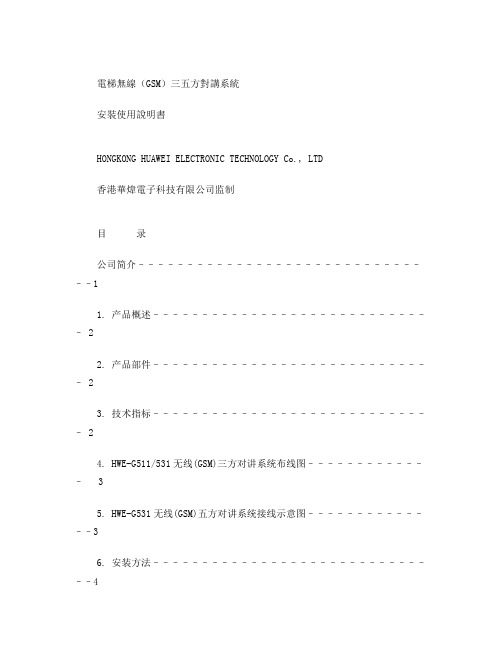
電梯無線(GSM)三五方對講系統安裝使用說明書HONGKONG HUAWEI ELECTRONIC TECHNOLOGY Co., LTD香港華煒電子科技有限公司监制目录公司简介–––––––––––––––––––––––––––––––11. 产品概述––––––––––––––––––––––––––––– 22. 产品部件––––––––––––––––––––––––––––– 23. 技术指标––––––––––––––––––––––––––––– 24. HWE-G511/531无线(GSM)三方对讲系统布线图––––––––––––– 35. HWE-G531无线(GSM)五方对讲系统接线示意图––––––––––––––36. 安装方法––––––––––––––––––––––––––––––47. HWE-G511/531无线(GSM)三(五)方对讲系统使用说明––––––––––58. 常见故障排除方法––––––––––––––––––––––––––69. 三包凭证––––––––––––––––––––––––––––––7维修记录单–––––––––––––––––––––––––––––7公司简介:烟台市华炜电子科技有限公司是香港华炜电子科技有限公司进驻大陆市场后在国内设立的首家公司,除从事广播发射机、射频功率放大器、射频电源等射频技术行业的研发、生产和销售外,现量身为国内各大电梯公司研发电梯无线报警通讯设备、民用和工业用无线音箱转换器的研发。
香港华炜电子科技有限公司是集研发、生产、销售为一体的高新技术企业,产品技术研发团队于2005年组建,历经7年多的锤炼,目前已在无线电发射、接收高频技术上累积了丰富的经验,取得了一项项技术上的突破与创新,可以为客户解决10MHz~3GHz、500W以下的射频电子设备的开发工程。
同时在多年的生产过程中公司也形成了完善的生产加工工艺和成熟的质量控制体系,使销售出的每台设备,其质量都得到了可靠的保证。
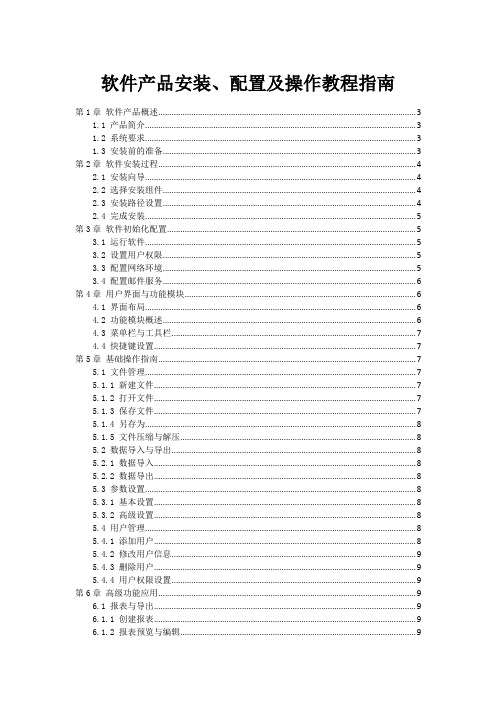
软件产品安装、配置及操作教程指南第1章软件产品概述 (3)1.1 产品简介 (3)1.2 系统要求 (3)1.3 安装前的准备 (3)第2章软件安装过程 (4)2.1 安装向导 (4)2.2 选择安装组件 (4)2.3 安装路径设置 (4)2.4 完成安装 (5)第3章软件初始化配置 (5)3.1 运行软件 (5)3.2 设置用户权限 (5)3.3 配置网络环境 (5)3.4 配置邮件服务 (6)第4章用户界面与功能模块 (6)4.1 界面布局 (6)4.2 功能模块概述 (6)4.3 菜单栏与工具栏 (7)4.4 快捷键设置 (7)第5章基础操作指南 (7)5.1 文件管理 (7)5.1.1 新建文件 (7)5.1.2 打开文件 (7)5.1.3 保存文件 (7)5.1.4 另存为 (8)5.1.5 文件压缩与解压 (8)5.2 数据导入与导出 (8)5.2.1 数据导入 (8)5.2.2 数据导出 (8)5.3 参数设置 (8)5.3.1 基本设置 (8)5.3.2 高级设置 (8)5.4 用户管理 (8)5.4.1 添加用户 (8)5.4.2 修改用户信息 (9)5.4.3 删除用户 (9)5.4.4 用户权限设置 (9)第6章高级功能应用 (9)6.1 报表与导出 (9)6.1.1 创建报表 (9)6.1.2 报表预览与编辑 (9)6.2 数据分析与挖掘 (9)6.2.1 数据预处理 (9)6.2.2 数据挖掘模型创建 (10)6.2.3 数据挖掘与分析 (10)6.3 定时任务设置 (10)6.3.1 创建定时任务 (10)6.3.2 管理定时任务 (10)6.4 系统监控与维护 (10)6.4.1 系统功能监控 (10)6.4.2 日志管理 (10)6.4.3 系统维护 (10)第7章系统集成与扩展 (11)7.1 接口调用 (11)7.2 系统对接 (11)7.3 定制开发 (11)7.4 插件安装与配置 (11)第8章数据备份与恢复 (11)8.1 备份策略 (11)8.1.1 定期备份:根据数据的重要性和更新频率,设定固定的备份周期,如每日、每周或每月进行一次备份。

Christopher L Kaija ––––Hacking the HallwaysSIEM and PSIM,RevisitedSession B10024 Christopher L Kaija, CISSPLake Health•Lake County Ohio’s primary Hospital provider, 30 miles east of Cleveland.•Lake Health has been operating as the primary health care provider in this area since 1902.•We are a non-profit with strategic partnerships with both the Cleveland Clinic and University Hospitals Seidman Cancer Center.Lake Health –ArcSight Infrastructure “Information wants to be free…. it also wants to be expensive” Steven Brand to Steve Wozniak, The Whole Earth ReviewWho is this person?•ArcSight Express 3.0, 4.0, Express 6.9.1c •ArcSight Logger 5.1 to 6.1•ConApp/ ArcMc migration to MC 2.2•Smart Connectors v5 to v7•IT industry since 2000, previous USN. Cisco, Juniper, Riverbed, F5 networks, Blue Coat, Aruba Wireless, Checkpoint etc.Tip of the Hat to the Experts •Colby DeRodeff–Co-Founder and CSO of Anomali, Inc. author of “The Convergence of Physical and Logical Security.”•Brian Contos–Securonix, Head of Worldwide Security Strategy and contributor to CSO online •They created and gave the original “Hacking the Hallways” presentations and podcast in 2006.Crime Prevention Through Environmental Design •CPTED principles include Natural Surveillance, Natural Access Control, Territorial Reinforcement, Maintenance and Management.•Most organizations handle the first three in a top notch fashion. Security Plans reviewed, planned, mapped, reviewed again, and finally approved and installed see the following examples.Natural Access ControlNatural Surveillance Aokigahara Forest, Japan Hitachi Seaside Park, JapanTerritorial ReinforcementDemographics: Environmental Studies •Sources of new untapped data analytics for use in multiple areas SIEM and PSIM integrations.•Govt. Census Data, Neighborhood breakdowns (address, zip code, county, city.)•Vendor based and free solutions abound: ESRI, Movoto, Cross Check, City-Data all have a free limited and paid version of the demographics they offer.Integrations, are they truly possible?•Yes, most vendors have either API’s or allow for database level queries to gain customer requested information.•You have to know what you want to find before pulling it all into a PSIM or SIEM. If you’re using a Big Data solution, there is more give and take, as the previous two may be size constrained.Office Space = RISK•IT Security should require constant review and mitigation of overall Organizational Exposure tounwanted or preventable risk.•Office Space –the immediate location or area under which an entity provides goods or services at a fixed or pre-determined location.•Mitigating controls would include constant review of policy, procedures, and the logical and physical security components to ensure nominal working order.Process Improvement?Case Study –The restraining order that could have worked.•Restraining Order issued for a person with a known vehicle license plate.•Video Surveillance software capable of scanning license plates and sending alerts based on recognition factors.•Due to system implementation restraining order was allowed to be violated due to inaction.Case Study –contd.•Process review –need for a Service Catalog, documentation, employee and Guard training, along with implementation and testing of the new capability.•Legal liability limited due to nature of the incident and parties involved.Case Study 2 –Violent Crime on the Commuter Train •2006 Homeland Security News Wire, writes a scathing article against the installation or use of dummy cameras as a means of deterrence.•2016 In response to a previous fatal shooting on a commuter train, BART admits not all cameras actuallyfunction, and states all trains will receive working cameras.•Legal Liability –Off the charts, as the legal precedence when seeing cameras at use in the area a prudent person expects a nominal amount of safety and security.Case Study 2 –Security is the new Free WiFi •Ask yourself –At your facilities, are all cameras live?•When you see signs that say “Protected by X” do you feel safer?•If you see a blue call box, do you expect it to work and someone to answer?•If so, society as a whole now has an expectation of Security –no longer should it be a ‘nice to have’ or an option.Case Study 3 –Fire in the Hole!•Life Saving –the quintessential must do of all Physical Security implementations is Life Saving, protecting the assets is a by-product.•Mag Locks, Card Readers, Alarm Panels, Elevators, all automatically react if an emergency is detected and this pre-programed response is activated automatically.Case Study 3 –contd.•In some organizations not all doors Fail Open in a fire, however the first responders have away around that –the Knox Box.•Knox Box –a small fire proof lock or combination box on the outside of a building that contains badges for use in an emergency that have been granted access to alldoors and areas within the premises.•Knox Box, key and/or combination are typically head by the local first responders who typically do not work for the organization.Case Study 3 –contd.•Organizations should after every incident pull all Physical Security access reports to review and track the locations of all Knox badge uses as appropriate.•If the incident was on the fifth floor, why was a badge used on the fourth, or in the R&D section at an adjacent building?Case Study 3 –contd.•Integrating your Physical Security infrastructure into your SIEM just makes sense.•SIEM’s typically already see where you logged in, what devices you use, what websites you browse, and what behavioral activity is deemed normal for your job role, individually or as a group.•Now expand to include every where you went inside the buildings, remotely across the world in real-time.ArcSight–Physical Security Modeling •This can be achieved in ArcSight Express 3.0c, 4.0c, 40c Patch 1, and ESM 6.9.0c and 6.9.1c. It is time consuming but highly doable even with limited staff.•Requirements –A high level of understanding or the Physical security infrastructure set up and dependencies.ArcSight–Mapping Cameras to Asset Zones •Two Ways to bring in yourSecurity Cameras –Vulnerability scan with autoasset creation or manually.•Locations –SF-HQ can be geo-located, if the network is uniquewith an ArcSight collection pointalso you can dynamicallymanage all assets and prioritizealerting in a more manageablefashion.•To remain consistent to thePhysical alarm structure keepyour Asset Zone names similarwhere possible.ArcSight–Alarm Panels to Asset Zones •Most vendors thealarm panel itself isnetwork aware, if itloses networkconnectivity the panelcontains a copy ofcard access andalarm configurations.ArcSight–Alarm Panels to Asset Zones •These typically can be taken into ArcSight the same way as the IP Cameras using either vulnerability scans and auto asset creation or manually. (Manual maybe best a lot of these are considered fragile systems.)•The same process can be used for all HVAC panels, generator panels, etc.ArcSight–Door/Card Readers to Alerting •This is the hardest part of this exercise –most Card Readers are near field devices with no ability to truly be network aware, so currently lake Health uses alternate interfaces off of the Alarm Panels to track door input fields and tie those back to logical names.•ArcSight–Alerting limitation –you can not alert on an Asset if an IP is not associated with it, so all Door alerts appear as Panel Alarms with additional information attached.ArcSight–Requirements to integrate Badges •Our Vendor –LENEL•Preferred –5 MS SQL system views that can be queried against remotely on a scheduled basis and output to csv. ( All badges, All Swipes, All Users, All User Activity, All Camera/ Panel Alarms.)•ArcSight Flex Connector –to read the above output.ArcSight–Current implementation •Automated Queries on the Lenel DB directly, ArcSight picks up files remotely processes and deletes old files.•SQL are on the next slide these are cleaned up and using default Lenel names for DB tables.•Process Improvements –SystemViews would remove application versioning issues with SQL table, and FlexConnector testing is time consuming.ArcSight–List for Badge to Unique User •This is used to refresh Active Lists with net new badges, users, or changes. This works in hand with IAM solutions to verify multiple data points.ArcSight–SQL Queries for Badge Swipes •This query ties all Badge Swipes to the User’s BadgeArcSight–Lenel give it all -•This query is a good one if you see weird fields or unparsed events in your Flex Connector.ArcSight–Requirements to integrate Cameras •Our Vendor –Axis, Hitachi, older Lenel •Preferred –All scripted API calls from the main management server –stills saved locally to SD card, and recorded video –archived to DC for review.•ArcSight–Alerts raised to a channel or dashboard, using integration commands that trigger scripts to fire if necessary.ArcSight–Current implementation •ArcSight Console –integrated command launch camera IP, Log on, Snap Still.•API’s for Axis Cameras and Python script that works on some Hitachi’s next slides.•Process Improvements –Get better at scripting, replace old cameras, review camera placements, cut OPEX.ArcSight–Still Camera API (sample)•This is from the original Hacking the Hallways the console UI and triggers virtually unchanged.ArcSight–IP Camera Vendors API scripts •Axis -/us/en/support/technical-notes/live-snapshots•Hitachi –depends on camera –Crucial imaging or standard –Hitachi support was able to provide the script used –I will check with them if we can distribute the support URL or pdf.ArcSight–Activate Framework –I do, Do you?•This is not available under ArcSight Express 3.0 or 4.0.•Activate was previously used within ESM.•Activate does work with new Express 6.9.0c and 6.91c.•Functionally it improves the performance and speed of the Manager, across all operations.ArcSight Activate Framework –100 ft view •Helps reduce Rule sprawl by condensing functional areas of interest into Packages.•As an example take the Express Package for Cisco Monitoring –its perfectly fine package works for all things Cisco.•However I also need rules, filters, content for Citrix NetScalers, Array Networks, F5, WatchGuard Firewall, Juniper router and firewall, various remote VPN solutions.•Activate does this all in a Network Monitoring Package, it’s possible not all the products will be there, but there are more than just Cisco.ArcSight–Activate –resources •HPe ArcSight Activate wiki –https:///foswiki/bin/view/ArcSightActivate/WebHome •HPe ArcSight–Protect 724https:///welcome•HPe ArcSight Marketplace –https:///marketplace/arcsightQuestions?41Private | Confidential | Internal Use OnlyFor more information–Seeking Insider Threats:B10054 –FRI –11:30 –Annapolis 1–HPe Security ArcSight as the security nerve center: B9909 –FRI –9:00 –Magnolia 1–Tuning and deploying with HPe Security ArcSight Marketplace and Activate Framework –600 HPe ShowcaseAlso at the Conference Additional sites of interest–HPe Security ArcSight ActivateThreat Intelligence packages:B10039 –WED –3:45 –Baltimore5–HPe Security ArcSight ESM –ESMnow and the way forward: B10334–Thu –4:15 Baltimore 2–/marketplace/arcsight–https:///welcome–https:///us/en/services/consulting.html–https:///us/en/services.html–/us/en/software-solutions/enterprise-security.html42––––。

2022年4月7目录1前言 (3)1.1 (3)1.2 (3)2 (4)2.1 (4)2.2 (5)3WEB UI (6)3.1 (7)3.2系统UI访问页面使用需求开发的端口 (7)3.3云数据库安全审计模式配置 (8)3.3.1开启接口审计功能 (8)3.3.2Agent (8)3.3.3Agent (10)3.3.4 (11)3.3.5 (11)3.3.6 (13)3.3.7 (17)3.3.8策略规则配置示例 (18)3.4 (32)3.4.1 (32)3.4.2 (34)4AGENT (35)5附录:防火墙代理模式配置手册 (44)1前言本手册主要介绍神州数码数据库安全审计系统的安装、配置、使用和管理。
通过阅读本文档,用户可以了解该系统的主要功能,并根据实际应用环境进行安装和配置。
1.1通过阅读本文档,能够快速地部署实施神州数码数据库安全审计系统,配置管理员达到对该系统主体功能熟悉和理解,有效地管理该防护设备,实现高效可靠的统一管理。
1.2本用户手册适用于具有基本网络、安全知识的系统管理员和运维人员。
2本章就神州数码数据库安全审计系统的系统架构、部署模式以及所涉及的基本概念进行简单介绍。
本章内容主要包括:产品概述:介绍产品的主要功能和适用对象。
部署模式:介绍系统在应用场景中的部署示意图。
2.1神州数码数据库安全审计系统是主动、实时监控数据库安全,集应用压力分析与访问控制为一体的专业产品。
在数据库安全审计方面系统采用有效的数据库安全审计方式,针对数据库漏洞攻击、风险操作、SQL注入等数据库风险操作行为,通过不同的审计规则发生记录和告警。
面向企业级用户,集应用压力分析与SQL监控审计为一体的产品。
它以旁路的方式部署在网络中,不影响网络的性能。
具有实时的网络数据采集能力、强大的审计分析功能以及智能的信息处理能力。
通过使用该系统,可以实现如下目标:分析数据库系统压力。
可审计Oracle、MySQL、SQL Server、HBase、Hive、Sybase、DM7等多种数据库。

SETUP GUIDEEMAIL APPLIANCEES4000PREPARATION RACK INSTALLATION CABLING THE APPLIANCE SOFTWARE/NETWORK SETUPMOUNTING THE BEZEL12345ALL RACKS MUST BE MOUNTED SECURELY. Ensure that all leveling jacks or stabilizers are properly attached to the rack. If installing multiple appliances in a rack, make sure the overall loading for each branch circuit does not exceed the rated capacity.Do not slide more than one appliance out from the rack at a time. Extending more than one appliance at a time may result in the rack becoming unstable. Install your appliance in the lower part of the rack for improved weight distribution and easier access to appliance components.Allow the hot plug SCSI drives and power supply units to cool before touching them. Always keep the rack's front door and all panels and components on the appliances closed when not servicing to maintain proper cooling.Ensure that the ship kit includes two power cords, the correct number of screws and cage nuts (pictured below), and the 19-inch and telco-style rack rail assemblies (described below). Choose a setup location with proper temperature control and adequate floor loading capacity for the current installation and for future growth.Install in or near appropriate AC outlets and Ethernet hubs or individual jacks (10/100 Base-T cables cannot be longer than 100 meters).Leave enough clearance, 65 cm (25 inches) in the front, and 75 cm (30 inches) in the back of the rack to provide access to appliance components and allow for sufficient airflow.Make sure you have a laptop or PC that can later be connected to the rear of the appliance to complete ES4000 configuration.Install and operate the appliance in a compatible rack only. Any other type of installation or use is not supported.Required operating conditions for the appliance are -Temperature: 10 to 35 C.Humidity, non-condensing: 5 to 80%.This appliance is intended for installation in restricted areas only. Initial setup and maintenance should be performed by qualified personnel.CAUTIONThere is a danger of explosion if the battery isreplaced incorrectly. Replace only with the same or equivalent type recommended by the manufacturer. Dispose of used batteries according to the battery manufacturer's instructions. To ensure properreplacement of the battery, contact technical support.Failure to properly ground the appliance, either by circumventing the 3-wire grounding-type plug or by using a power outlet that is improperly grounded, can create a potentially hazardous electrical situation.To prevent the unit from overheating, never install the appliance in an enclosed rack or a room that is not properly ventilated or cooled. For proper airflow, keep the front and back sides of the appliance clear of obstructions and away from the exhaust of other equipment.Electrostatic Discharge (ESD) precautions arerequired before handling the appliance. Wear a wrist strap with an appropriate ground connection.Power down the appliance by removing the bezel and pressing the power button. The appliance will safely shut down its software and the fans will stop. Remove the power cords before servicing the unit.Do not use mats designed to decrease static electrical discharge as protection from electrical shock. Use only mats that have been specifically designed as electrical insulators.1oUnpacking the ApplianceSetup LocationRack and Appliance Precautions(Eight) M6 x 12Flat head screws (Two) M6 x 20 Pan head screws(Ten) M6 Cage nuts19-inch rack screws and cage nutsTelco-style rack screws(Twelve) M4 x 4Truss head screws(Two) 10-32 x 3/4"Truss head screwsFixed front rail(attached prior to shipment)19-inch rack assembly consists of:(Two) long rails that attach directly to the rack.(Two) medium-sized adjustable brackets that attach to the long rails.The telco-style rack assembly consists of:(Two) long rails. (Six) short rack brackets that attach to the long rails. Two of these brackets have threaded holes for securing the appliance in the rack.19-inch and telco-style rack assemblies both include:Two fixed front chassis rails that come attached to the appliance.Note: The screws required to attach the assembled rails to a telco-style rack are not included.Align the fixed chassis rails on the appliance with the fixed rack rails as shown.Carefully slide the appliance into the rack rails until you hear the rails click into place. Push the appliance all the way back into the rack until it stops. Secure the unit in the rack by inserting and tightening both M6x20 screws as shown.Attach the two rail assemblies to the 19-inch rack. The medium-sizedbrackets are attached to the two rear posts. Mount the rails in the front by attaching two M6x12 screws and three cage nuts as shown (the third cage nut is used in Step 3 to secure the appliance in the rack). Mount the rails in the back by attaching two M6x12 screws and two cage nuts for each post as shown. Make sure the railassemblies are properly aligned at the front and back and are level in height on the left and right sides.Step 1 (telco-style rack)Locate the two long rack rails and the six short brackets.Note: The screws required to attach the assemblies to a telco-style rack are not included.Note: Refer to your rack'smounting hardware for the proper size and type of screws to secure the appliance in the rack.Attach the four short brackets to the front and back of the telco-style rack as shown and tighten.Make sure the bracketsare aligned and level in height on the left andright sides.Tighten each of the screws that were used to attach the four short brackets to the long rack rail in Step 1.Securely attach the short brackets with the threaded holes to the front of each long rack rail as shown. Use two M4 truss head screws for each bracket.Loosely attach one set of the non-threaded brackets to the long rails using one M4 truss head screw for each bracket as shown (you will tighten them in Step 2). These brackets are attached with the three-hole tab toward the rear of the long rail in preparation for attachment to the front of the rack.Loosely attach the remaining set of non-threaded brackets to the long rails using one M4 truss head screw for each bracket as shown (you will tighten them in Step 2). These brackets are attached with the three-hole tab toward the front in preparation for attachment to the back of the rack.Step 2 (telco-style rack)Attach the rail assemblies to the rack using a total of 12 screws.Align the fixed chassis rails on the appliance with the fixed rack rails attached to the rack. Carefully slide the appliance into the rack until you hear the rails click into place. Push the appliance all the way back into the rack until it stops. Secure the appliance in the rack using two 10-32x3/4" truss head screws and two cage nuts. Attach the screws and nuts to the center hole of each three-hole tab.NOTE: The following installation procedures: 2a, 19-inch Width Rack and 2b, Telco-Style Rack are for use with the rails provided in your ship kit. Follow the instructions in either 2a or 2b , depending on the rack you are using.If a different style of rails is used, refer to the instructions provided with that rail’s ship kit. You should also refer to the instructions that came with the rack you are using.19-INCH WIDTH RACK INSTALLATION2aTELCO-STYLE RACK INSTALLATION2bUIDFixed front rail(attached prior to shipment)M6x20 ScrewsLocking tabSmall fixed rack bracketsSmall fixed rack brackets with threaded holesSmall fixed rack brackets(2) M4 truss head screws(1) M4 truss head screwLong railsABCBC A(3) Telco rackscrews*(3) Telco rackscrews*(3) Telcorack screws*(3) Telco rack screws**Telco rack screws arenot included.UIDFixed front rail(attached prior to shipment)10-32 x 3/4"Truss head screwsLocking tabRear medium-sized adjustable bracketRaised rivetStep 1 (19-inch width rack)Step 2 (19-inch width rack)Locate the two long rack rails and the two medium-sized adjustable brackets. Attach each adjustable bracket to its matching long rail by inserting the raised rivet on the medium-sized bracket into the round opening at the front of the slot on the long rail. Slide the adjustable bracket backward to keep the two pieces from coming apart. The brackets slide to accommodate different rack depths.Cage nuts (front)*M6 x 12flat head screwsCage nuts (rear)Long fixed rack bracketsRear medium-sized adjustable bracketM6 x 12flat head screws(rear)Step 3 (19-inch width rack)The middle cage nut is for securing the appliance in the rack.*Step 3 (telco-style rack)Copyright © 2000-2008 Sophos Group. All rights reserved. Sophos and ES4000 are trademarks of Sophos Plc and Sophos Group.4SOFTWARE/NETWORK SETUPMOUNTING THE BEZEL5To remove the bezel, press the buttons at both ends, and slide the bezel straight out.FCC NoticeThis device complies with part 15 of the FCC Rules. Operation is subject to the following two conditions: (1) This device may not cause harmful interference, and (2) this device must accept any interference received, including interference that may cause undesired operation. NoTelecommunications Network Voltage (TNV)-connected PCBs shall be installed. This class A digital apparatus complies with Canadian ICES-003. Cet appareil numérique de la classe A est conforme à la norme NMB-003 du Canada.CE Mark WarningThis is a Class A product. In a domestic environment, this product may cause radio interference, in which case the user may be required to take adequate measures.VCCI WarningThis is a product of VCCI Class A Compliance.1. Hold the bezel with both hands.2. While pressing the spring-loaded button at both ends, gently push the bezel straight in until you hear it lock into place.Network (1) USB 0/1 PortsConfiguration (2)Serial PortPower Supply Locks Power Indicator LEDsPower Supplies (560w each)AC Power InletsEthernet Cables 3CABLING THE APPLIANCEPower CordsNOTE: The Power Supply Status LEDs on the rear panel illuminate green during normal operation. During standby or when powered down, these LEDs are yellow.Port Service Connection Purpose Port Service Connection Purpose Step 1 (Configure port access)The ES4000 uses specific ports for internal and external connections. Configure your network to allow access on the ports listed below.External Connections25 smtp Internet to Appliance Unfiltered email enters the network 25 smtp Appliance to Internet Mail leaves the network 22 ssh Appliance to Remote assistance 80 http Appliance to Internet Software downloads 443 https Appliance to Registration 123 ntp Appliance to [UDP] clock synchronization Internal Connections25 smtp Appliance to LAN Mail to internal MTA389 ldap Appliance to LAN Active Directory integration 3268 ldap Appliance to LAN Global Directory queries 53 dns Appliance to LAN [UDP] DNS queries 20,21 ftp Appliance to LAN Backups25 smtp LAN to Appliance Mail from the internal MTA 18080 https LAN to Appliance Admin Interface443httpsLAN to ApplianceEnd User Web Interface1. On your laptop, set the subnet mask to 255.255.255.0 and the IP address to 172.24.24.12. Using a supported browser, connect to https://172.24.24.172You may need to add this address to Internet Explorer’s Trusted Sites. When prompted, accept the invalid certificate.3. Use the Configuration Wizard to set up your ES4000Note : On the Network Interface page of the Configuration Wizard, the Speed option is set to Auto by default. If selecting another setting from the drop-down list, it must match the speed of your managed switch for the ES4000 to operate correctly.4. Disconnect the Ethernet or crossover cable from the Internal Configuration Interface (2).Note : After setup is complete, administer your appliance via a web browser at https://<Your-Hostname-or-IP >:18080To configure your ES4000, you will need the following: Activation code from Sophos (required to register the ES4000) IP address and fully qualified domain name for the ES4000 IP address of the default gateway IP addresses of DNS serversHostnames and DNS types for internal mail delivery servers Domains for which the ES4000 accepts mailIP addresses or hostnames of mail relays allowed to relay outbound mail through the ES4000[Optional] Active Directory information (server, port, etc)Step 2 (Configure ES4000 settings)UID Button/LEDNIC1HDD Status Power Indicator NIC2TemperatureUnit Identifier1. Connect both of the power cords to the AC inlets. Preferably, connect the cords to AC outlets on separate circuits.2. Connect the Network Interface (1) to your LAN.3. Temporarily connect the InternalConfiguration Interface (2) to yourlaptop using either an Ethernet cable or a crossover network cable.4. Press the power button to the right of the LEDs on the front of the unit.。
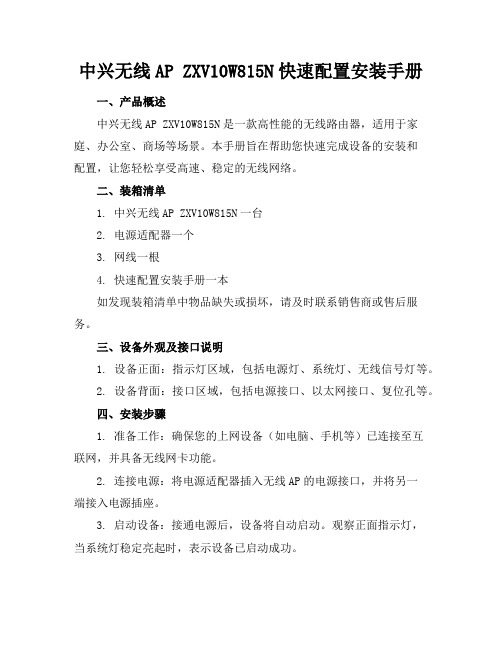
中兴无线AP ZXV10W815N快速配置安装手册一、产品概述中兴无线AP ZXV10W815N是一款高性能的无线路由器,适用于家庭、办公室、商场等场景。
本手册旨在帮助您快速完成设备的安装和配置,让您轻松享受高速、稳定的无线网络。
二、装箱清单1. 中兴无线AP ZXV10W815N一台2. 电源适配器一个3. 网线一根4. 快速配置安装手册一本如发现装箱清单中物品缺失或损坏,请及时联系销售商或售后服务。
三、设备外观及接口说明1. 设备正面:指示灯区域,包括电源灯、系统灯、无线信号灯等。
2. 设备背面:接口区域,包括电源接口、以太网接口、复位孔等。
四、安装步骤1. 准备工作:确保您的上网设备(如电脑、手机等)已连接至互联网,并具备无线网卡功能。
2. 连接电源:将电源适配器插入无线AP的电源接口,并将另一端接入电源插座。
3. 启动设备:接通电源后,设备将自动启动。
观察正面指示灯,当系统灯稳定亮起时,表示设备已启动成功。
4. 连接上网设备:使用网线将无线AP的以太网接口与上网设备的网络接口连接,或者通过无线方式连接至无线AP的SSID。
五、配置无线网络1. 打开浏览器,输入默认IP地址(通常为192.168.1.1)进入无线AP的管理界面。
2. 输入管理员账号和密码(默认均为admin),登录管理界面。
3. 在管理界面中,找到“无线设置”或“WiFi设置”选项,进入无线网络配置页面。
4. 设置无线网络名称(SSID):为您的无线网络起一个易于识别的名称。
5. 设置无线网络密码:为您的无线网络设置一个安全性较高的密码,确保网络安全。
6. 保存设置并重启设备。
六、高级设置a. 更改管理员密码:在管理界面中,找到“系统设置”或“管理员设置”,修改管理员账号和密码。
b. 开启WPA3加密:在无线设置中,选择WPA3作为加密方式,提高无线网络安全。
a. 频道选择:在无线设置中,选择一个干扰较小的频道,以提升无线信号质量。
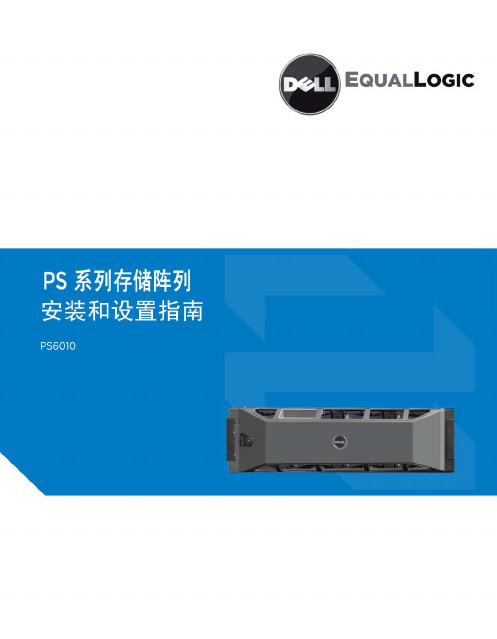
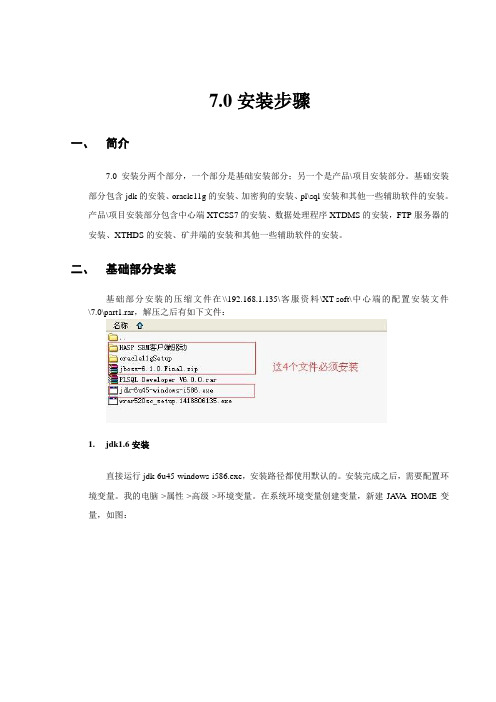
7.0安装步骤一、简介7.0安装分两个部分,一个部分是基础安装部分;另一个是产品\项目安装部分。
基础安装部分包含jdk的安装、oracle11g的安装、加密狗的安装、pl\sql安装和其他一些辅助软件的安装。
产品\项目安装部分包含中心端XTCSS7的安装、数据处理程序XTDMS的安装,FTP服务器的安装、XTHDS的安装、矿井端的安装和其他一些辅助软件的安装。
二、基础部分安装基础部分安装的压缩文件在\\192.168.1.135\客服资料\XT-soft\中心端的配置安装文件\7.0\part1.rar,解压之后有如下文件:1.jdk1.6安装直接运行jdk-6u45-windows-i586.exe,安装路径都使用默认的。
安装完成之后,需要配置环境变量。
我的电脑->属性->高级->环境变量。
在系统环境变量创建变量,新建JA V A_HOME变量,如图:在系统环境变量里面找到path变量,修改path变量的值,如图:在path的变量值里面,添加%JA V A_HOME%\bin; %JA V A_HOME%\jre\bin;配置完成之后,在dos命令模式下输入java –version 弹出了java的版本信息表示java的环境变量就配置成功了。
2.加密狗安装解压加密狗的压缩文件,运行HASPUserSetup.exe,按下一步安装完成之后,需要把加密狗的两个dll文件(hasp_windows_102525.dll和HASPJava.dll)copy到java\ bin目录下面和java\jre\bin的目录下面。
输入网址http://127.0.0.1:1947打开能够看到信息,表示加密狗驱动程序安装成功,如果jboss启动的时候报加密狗错误,也可以在这个网址上面找到加密狗的相关信息来判断加密是否有误。
3.数据库安装运行文件夹里面的setup.exe,在填写system密码的时候统一用password 如图:然后点下一步就可以安装完成。

RG-WS6008系列无线控制器文档版本:V1.01版权声明copyright © 2015锐捷网络保留对本文档及本声明的一切权利。
未得到锐捷网络的书面许可,任何单位和个人不得以任何方式或形式对本文档的部分内容或全部进行复制、摘录、备份、修改、传播、翻译成其他语言、将其全部或部分用于商业用途。
以上均为锐捷网络的商标。
本文档提及的其他所有商标或注册商标,由各自的所有人拥有。
免责声明您所购买的产品、服务或特性等应受商业合同和条款的约束,本文档中描述的全部或部分产品、服务或特性可能不在您的购买或使用范围之内。
除非合同另有约定,锐捷网络对本文档内容不做任何明示或默示的声明或保证。
由于产品版本升级或其他原因,本文档内容会不定期进行更新。
锐捷网络保留在没有任何通知或者提示的情况下对文档内容进行修改的权利。
本手册仅作为使用指导。
锐捷网络在编写本手册时已尽力保证其内容准确可靠,但并不确保手册内容完全没有错误或遗漏,本手册中的所有信息也不构成任何明示或暗示的担保。
前言感谢您使用锐捷网络产品,本手册为您提供了详细的硬件安装指南。
使用范围本手册主要介绍了产品在功能上和物理上的一些特性,提供了安装步骤、故障排除、技术规格,以及电缆和连接器的规格和使用准则。
适用于想对上述内容进行了解且在安装和维护网络硬件方面具有一定经验的用户。
同时假定该款产品的用户熟知相关术语和概念。
技术支持⏹锐捷网络官方网站:/⏹锐捷网络在线客服:⏹锐捷网络官方网站服务与支持版块:/service.aspx⏹7×24小时技术服务热线:4008-111-000⏹锐捷网络技术论坛:⏹常见问题搜索:/service/know.aspx⏹锐捷网络技术支持与反馈信箱:4008111000@文档格式约定本书采用各种醒目标志来表示在操作过程中应该特别注意的地方,这些标志的意义如下:注意、警告、提醒操作中应注意的事项。
说明、提示、窍门、对操作内容的描述进行必要的补充☑对于产品的支持情况进行必要的补充。
某企业全称
产品安装配置手册
企业全称
2020年8月22日
文档属性
文档变更
文档送呈
目录
1前言 (4)
1.1概述 (4)
1.2适用对象 (4)
1.3名词术语表 (4)
2产品运行环境 (5)
2.1硬件环境说明 (5)
2.2软件环境说明 (5)
3安装配置过程 (6)
3.1XX产品部署步骤 (6)
3.1.1详细的安装过程 (6)
3.1.2环境变量的设置 (6)
3.2XX产品初始化配置 (6)
3.2.1产品超级管理员配置 (6)
3.2.2产品基本配置 (6)
4产品程序运行 (7)
4.1服务启动方法 (7)
4.2服务关闭方法 (7)
4.3登录系统 (7)
5图表目录 (8)
1 前言
1.1 概述
1.2 适用对象
本手册适用于以下人员:
◆安全管理员
◆安全主管
◆IT设计人员
◆系统安装与部署管理员
◆网络系统管理员
1.3 名词术语表
表格1.名词术语表
2 产品运行环境2.1 硬件环境说明2.2 软件环境说明
3 安装配置过程
3.1 XX产品部署步骤
3.1.1 详细的安装过程
3.1.2 环境变量的设置
3.2 XX产品初始化配置3.2.1 产品超级管理员配置3.2.2 产品基本配置
4 产品程序运行4.1 服务启动方法4.2 服务关闭方法4.3 登录系统
5 图表目录
附图目录
未找到图形项目表。
表格目录
表格1.名词术语表 (4)。